Teeth grinding, or bruxism, is a condition in which the patient grinds or clenches teeth in an involuntary way. Over time, this movement damages the patient’s teeth and may lead to jaw pain and headaches, and cause further complications with oral health.
Bruxism can affect both adults and children. Although it’s more common for people to grind their teeth at night, it may also happen during the day. Sufferers usually aren’t aware they are grinding their teeth at all.
This condition can be caused by a range of things, but it is most often attributed to stress or anxiety. It can be hard to stop teeth grinding completely, but there are many ways to lessen its effects. Most people begin by using a mouth guard at night.
In this article you can find out what causes bruxism, how to identify the symptoms, and what to do if you or someone you know is grinding their teeth.
In This Article
What is bruxism?
This condition, also known as teeth grinding, involves excessive grinding or clenching of the teeth – usually without the person realizing they are doing it. In the US, an estimated 30-40 million people are affected by bruxism.
Some 12% of Americans named tooth grinding as the bad dental habit that they’d most like to give up. And although we all sometimes grind or clench our teeth to some extent, people suffering from bruxism do it to the point that it starts to damage their teeth or cause other medical problems.d
The condition can manifest itself in two ways:
- Dynamic bruxism involves grinding jaw movements from side to side or from front to back, and usually occurs during sleep.
- Static bruxism is a clenching of the teeth without making a sound, and more often happens during the day.
Teeth grinding at night
Nocturnal bruxism, the name for grinding your teeth in your sleep, represents the large majority of cases. During sleep, patients grind their teeth in an involuntary and unconscious manner.
Asleep bruxism often occurs alongside other sleep disorders such as snoring and sleep apnea. Patients commonly experience fatigue as their sleep is so badly disrupted. The same goes for anyone who may be sharing a room with them.

If you notice your partner grinding their teeth in their sleep, bring it to their attention. Encourage them to visit a dentist, who can check for signs of wear on teeth. Once diagnosis is confirmed, action can be taken, such as wearing a night guard for teeth grinding or mouth taping, to reduce any oral damage and identify the underlying cause.
In some cases it may be necessary to study a patient’s sleep patterns, which involves spending a night at a sleep clinic. The majority of cases don’t require this, but for particularly problematic cases it can be the most reliable diagnosis.
If you wake up with your teeth aching and a sore jaw, you are most likely grinding your teeth at night or sleeping with a clenched jaw. Another sign of these nighttime jaw problems can be waking up with a headache.
All of these signs point to a problem with your jaw joints, known as your temporomandibular joints. This can be worse during seasons of life where you’re stressed, or it can just be a chronic problem that needs to be treated with a custom-made night guard.
Dr. Brandon Murri, Family & Cosmetic Dentistry of the Rockies
Why do people grind their teeth?
Bruxism treatment is complicated by the fact that there are so many possible causes for the condition. In fact in some cases, the cause may never be known.
However, current medical knowledge points towards the following factors:

- Anxiety and stress – with grinding or clenching worsening as stress levels increase
- Dental malocclusion (misalignment of teeth) – although medical opinion is divided as to whether this is an outright cause, an aggravating factor, or a result of grinding
- Psychosocial problems
- Taking antidepressants
- Taking drugs such as ecstasy
- Smoking – smokers are five times more likely to experience problems
- High alcohol or caffeine consumption
- Sleep disorders
- Neurological conditions like Parkinson’s and Huntington’s disease
Genetic causes cannot be ruled out. There appears to be a link, but it has not yet been clearly demonstrated.
Of all these bruxism causes, stress and anxiety are by far the most common. Almost 70% of diagnosed cases result from stress, for example at work or school. People who don’t handle stress well are more likely to grind their teeth.
Most people experience stress to varying degrees at different times of their lives. Often when stress levels subside, the tooth grinding problem disappears too.
This USA Today article gives more information about the links between stress and bruxism, and tobacco use and alcohol consumption and bruxism.
Bruxism symptoms
Many people are unaware that they are grinding their teeth, especially at night. The most obvious symptom of bruxism is the sound of scraping and grinding. It is an unpleasant noise which those nearby are likely to notice.
But you can’t count on other people to mention this to you, so you should look out for other teeth grinding symptoms. These include:
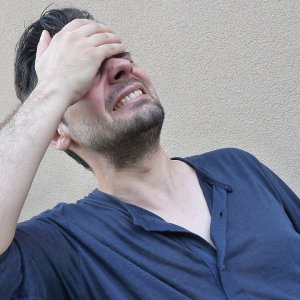
- Muscle pain around the jaw and the temporomandibular joint. This leads to a sensation of stiffness and can limit capacity to open the mouth wide.
- Earaches and tinnitus
- Headaches
- Pain around the neck, cheeks and shoulders
- Disrupted sleep or waking up feeling tired despite thinking you have slept for long enough
- Excessive wear on the surface of teeth (which can lead to tooth sensitivity)
- Broken tooth fillings, crowns or other dental prostheses
- Cracked or fractured teeth
- Gums bleeding at night or in the morning
Your dentist will be able to check for signs that your teeth are being damaged by grinding. If you’re concerned, mention this at your next dental checkup.
Effects of teeth grinding
On teeth
When teeth are put under pressure from clenching or grinding, the outer layer of enamel starts to wear or chip away. This exposes the next layer of the tooth – dentin. At this point patients are likely to notice their teeth becoming more sensitive to hot and cold.
Teeth may also become yellow or discolored. This is because dentin is an orangey-yellow color and it’s the outer enamel which gives teeth their whiter appearance. When enamel is worn down, the color of the dentin shows through.
When the protective layer of enamel erodes, teeth are at greater risk of decay and cavities.
Teeth will also be more susceptible to tooth fractures, especially in severe cases. This can expose the tooth nerve, causing it to become necrotic and die. You may even experience tooth resorption. Root canal work may then be needed to prevent infection or a tooth abscess.
In addition, dental restorations and prostheses, including fillings, crowns, tooth bridges and veneers, can easily become damaged from tooth clenching or grinding.
If a patient can find a way to stop their tooth grinding they may then want to improve the aesthetic appearance of any damaged teeth with veneers or crowns. However, dentists usually won’t fit these while the condition is still active.
On joints
Increased clenching and grinding puts greater strain on muscles and the temporomandibular joint (jaw).
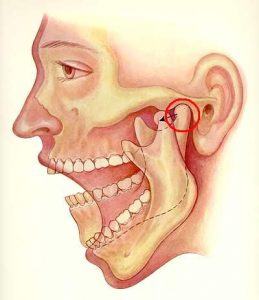
Patients may notice their jaw feels particularly stiff or painful in the mornings, when they wake up. They may also find it harder than before to open their mouth wide, and yawning might become painful.
The jaw may start to make alarming cracking noises during movement from talking or eating. In more serious cases, the jaw can become locked, caused by joint displacement or arthritis in the joint.
Each patient will experience these teeth grinding symptoms to different degrees, but they certainly don’t help with stress or anxiety levels. In fact, the manifestation of these effects can make anxiety worse, resulting in a vicious cycle. This is especially true if the patient has never heard of these bruxism symptoms – or even the condition itself – so is unsure whether to seek medical help.
Other consequences
In the most serious cases, there may be destruction of the alveolar bone, aggravation of periodontal illnesses like gingivitis, muscle pain in the head and mouth or even muscular hypertrophy (where the muscles grow to be abnormally large because of overuse).
Teeth grinding in children and babies
Figures for bruxism in children indicate that around 20% of children can be affected. However, real figures may be higher as the condition can often go unnoticed.
It is considered to be a sleep disorder and related to nocturnal arousals, so it can often lead to behavioural problems due to poor sleep patterns. An episode lasts on average for 4 seconds and can happen up to 6 times an hour during the night, making for a tired and irritable child the next morning.
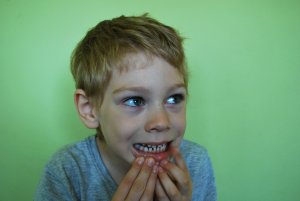
Of course it is also distressing for a parent to hear their child or baby grinding their teeth. It most often happens after the baby teeth or adult teeth first appear. By the time adult teeth are fully formed, the grinding behaviour should have stopped.
There appears to be a clear relationship between children grinding teeth and breathing irregularities such as breathing through the mouth due to obstructed airways. Some surgeries can address problems related to sleep disordered breathing.
Anxiety and stress have also been linked, although they may be a result of interrupted sleep rather than the cause of grinding teeth. In any case, calming activities before bedtime can reduce anxiety and hyperactivity.
Bruxism treatment
The initial course of action is usually to limit further damage caused by tooth grinding. Following this, a full diagnosis can be conducted.
A mouth guard for grinding teeth
Most dentists will recommend patients try wearing a bruxism mouth guard at night to protect teeth.
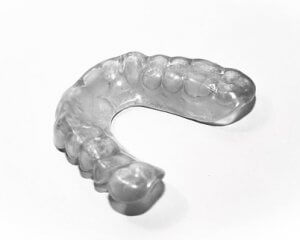
A mouth guard creates disocclusion between the upper and lower jaw; in other words, they can no longer touch and cause abrasion to teeth. The teeth grinding guard also absorbs some of the pressure from clenching and grinding.
An added benefit is a big reduction in the noise from tooth grinding at night – which can be a huge relief for the patient’s partner!
The teeth are completely covered by the mouth guard so there is no contact between any upper and lower teeth.
Let’s be clear that a bruxism mouth guard is not a cure for this condition, no matter what the causes. It simply allows the jaw and muscles to relax and rest, thanks to the diminished pressure.
A mouth guard is not usually recommended for very young children whose facial and dental structure are still growing as it may interfere with normal dental development.
Bruxism mouth guard costs
Over-the-counter dental guards like Dentek guards are available for around $20-$30. Although affordable, these guards don’t offer a perfect fit and may not be as durable as custom-made varieties.
If you are grinding your teeth during the day, you can relax your jaw by making an ‘n’ sound repeatedly. Exercising regularly and moving throughout the day also prevents tensing up while working. Take the time to straighten your posture as a hunch pushes your jaw out, encouraging teeth to touch and grind.
Avoid caffeinated drinks such as coffee and energy drinks, as these are stimulants and encourage muscle movement. Both caffeine and alcohol also disrupt your sleeping patterns, increasing the chances of muscle activity and teeth grinding during the night.
Dr. Kirrin Punia, Fresh Smile Clinic
A better option is to ask your dentist about getting a custom mouth guard or splint. These are created from a dental impression and created in a laboratory to fit your teeth perfectly. The result is a more comfortable and longer-lasting product.
This custom-made option is more expensive but if you have a dental insurance plan, check your policy to see if you might be covered for all or partial costs.
Smile Brilliant makes custom-made mouth guards that you can order and fit from your home. They make it easy to make impressions of your teeth, and then send them in—with postage already paid for—to the dental lab where they will be tailored to fit your teeth perfectly.
They also keep your records on file so that when you need to order another guard, you don’t have to take your impressions again. Plus, there’s a 45-day trial, so if you aren’t convinced after 45 days, you’ll get a full refund.
Type of Mouth Guard | Over-the-counter | Custom-made |
Cost | $20 - $30 | $200 - $500 |
Shape | Standard - one size fits all | Custom made to fit your mouth |
Life span | Up to 1 year | Several years (if needed) |
How to use | Boil in water to soften the plastic and fit to upper or lower teeth | A dental professional makes a cast of your mouth and sends it to a laboratory where the night guard is made |
Other teeth grinding treatments
- Desensitizing varnish: Applied by a dentist to protect teeth from sensitivities caused by erosion of enamel
- Fluoride gels: A desensitizing treatment that can be applied at home
- Orthodontic treatment: If a malocclusion is responsible for or caused by grinding, the patient may be able to wear braces to rectify the bite. In mild to moderate cases, invisible braces may be preferable as they have the same protective effect as a mouth guard
The unconscious tooth grinder should make an effort to change their sleeping position and sleep on their side. This is because the condition tends to worsen when the patients sleeps on his or her back.
Watch the following video for a detailed explanation of this condition and possible ways to treat it:
How to stop grinding teeth
Although there is no guaranteed permanent bruxism cure, there are various treatments and techniques that may help address the underlying causes.
Relaxation
When the condition is linked to stress, there are ways to address the root causes using relaxation techniques. These include yoga, meditation, psychotherapy and Cognitive Behavioural Therapy (CBT).
For these techniques to work, the patient must be totally committed to the course of treatment. It might be costly, but it can also work in a lasting and effective way.
Exercise
Where stress is a major factor, exercise can help. This is because exercise releases endorphins – chemicals that help to relieve stress in the brain.

Diet management
Since stimulating beverages can make the problem worse, avoid alcohol and caffeine (including tea, coffee and caffeinated soft drinks) before going to bed. Even consider cutting them out completely for a few weeks to see if you notice a difference.
The same goes for smoking – and there are numerous health benefits from quitting.
Muscle exercises
When the condition is not psychological in nature, stretching exercises may help. If the chewing muscles in the jaw are exercised regularly, they are put under less strain during an episode of clenching or grinding.
Muscle relaxants
Sufferers tend to experience pain in the muscles that are often under pressure. Certain muscle relaxants can counter this. However, you should discuss this option with your doctor or pharmacist before beginning treatment since some myorelaxants are addictive.
Some patients have experienced improvements after having botulinum toxin (botox) administered to the chewing muscles. Botox reduces muscular strength, which limits damage caused by grinding teeth. However, this is a very new technique and as such there is little medical research supporting its effectiveness and long-term effects.
Hypnosis
Because grinding teeth happens subconsciously, hypnosis can prove to be effective in certain cases. This treatment can also help with underlying causes such as stress and anxiety.
We recommend you consult your dentist or another medical professional before beginning any bruxism treatment.
Conclusion
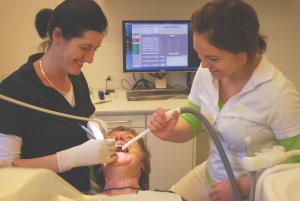
No treatment can guarantee to be a complete and permanent bruxism cure, as it is an involuntary and unconscious action. When a person suffers at night, the important thing is to become aware of the problem, often thanks to an attentive partner. Sufferers should take steps to limit further dental damage before finding a solution.
A consultation with a dental professional should be your first step in confirming diagnosis and assessing the extent of any damage caused.
If you are able to understand what causes or triggers the condition, you can take steps to reduce pain and damage in the short term. In the long term, you may even be able to eradicate the problem.
Sunstar: Global Healthy Thinking Report. Consulted 11th September 2024.






